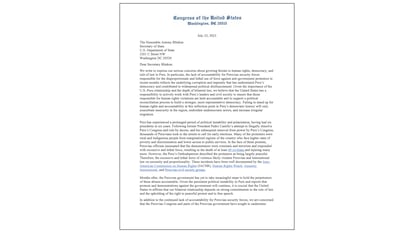US Democrats pressure President Dina Boluarte over Peru’s human rights violations
A letter from 15 congresspeople to Secretary of State Antony Blinken, to which EL PAÍS has had exclusive access, expresses ‘serious concerns about growing threats to human rights, democracy and rule of law’


On Thursday, while President Dina Boluarte was finalizing details of her speech for July 28, the date on which Peru’s independence is commemorated, a group of fifteen U.S. Democratic congresspeople sent a letter to Secretary of State Antony Blinken. The purpose of the missive was to alert him of what is happening in Peru, a country plunged in social convulsion since Boluarte was sworn in as president last December after the failure of Pedro Castillo’s self-coup.
EL PAÍS has had access to the document, headed by Joaquín Castro (Texas) and Sydney Kamlager-Dove (California), ranking Democrats on the House Foreign Affairs Subcommittee on the Western Hemisphere. The main concern expressed in the letter is “the lack of accountability for Peruvian security forces responsible for the disproportionate and lethal use of force against anti-government in recent months,” which, according to the lawmakers, “reflects the underlying corruption and impunity that has undermined Peru’s democracy and contributed to widespread political disillusionment.” Between December and February, the peak of the mass protests, 49 civilians died due to military and police repression and another 11 died due to roadblocks. Seven military personnel and one police officer lost their lives in the context of the demonstrations. The protests have been reignited since July 19.

The Democrats believe that, given their deep bilateral relationship, “the United States has a responsibility to actively work with Peru’s leaders and civil society to ensure that those responsible for human rights violations are held accountable and to support a political reconciliation process.” Failure to do so “at this inflection point in Peru’s democratic history will only exacerbate insecurity in the region, embolden undemocratic actors, and increase irregular migration,” the document continues.
In the letter — which has also been sent to the U.S. Ambassador to Peru, Lisa Kenna — the representatives emphasize that the bulk of the protesters “were rural and Indigenous people from marginalized regions of the country who face higher rates of poverty and discrimination and lower access to public services.” They denounce that although the country’s Ombudsperson described most of the protesters as peaceful, “Peruvian officials insinuated that the demonstrators were criminals and terrorists.”
In the missive, the congresspeople lay out a list of six measures they request from the U.S. State Department. The most drastic consists of “coordinating with the U.S. Department of Defense to temporarily suspend joint exercises or cooperation with units of the Peruvian security forces allegedly responsible for human rights violations, as well as conducting an investigation into whether such units received security assistance from the United States.” If proven, they demand that “further assistance be restricted.”
They also call for the creation of an Interdisciplinary Group of Independent Experts in Peru to provide legal and technical assistance to clarify the murders, a recommendation already made by the Inter-American Commission on Human Rights (IACHR). The lawmakers also ask for support to be provided to the Peruvian Prosecutor’s Office to “guarantee exhaustive, prompt and impartial investigations.” They are concerned that after several months, “the Peruvian government has yet to take meaningful steps to hold the perpetrators of these abuses accountable.”
According to spokespeople from the office of Congressman Joaquin Castro (Texas), “there has been no public update on what evidence has been collected or who is being investigated, and members of civil society have expressed serious concerns about the lack of transparency and urgency in the process.” “An Amnesty International report found that decision-makers at the highest levels also actively sought to conceal the weapons used to kill protesters,” they told EL PAÍS.
Another part of the letter lists a series of issues involving the Peruvian Congress, an institution whose disapproval usually hovers around 90% in the polls. The lawmakers denounce the removal of the interim Ombudsperson, Eliana Revollar, as a reprisal for having spoken out against the “villanization of the demonstrators by the government” and replacing her with José Gutiérrez, a former congressman “with neither experience nor knowledge of human rights.” They also state their rejection of the “replacement of six of the seven members of the Constitutional Tribunal in a process that lacked transparency and clear criteria for the selection of candidates.”
In addition to Joaquín Castro (Texas) and Sydney Kamlager-Dove (California), the motion is signed by Nanette Díaz-Barragán (California), chair of the Congressional Hispanic Caucus; Raul M. Grijalva (Arizona), member of the Natural Resources Committee; Jim McGovern (Massachusetts), member of the Rules Committee; Alexandria Ocasio-Cortez (New York), of the Hispanic Caucus. Rounding out the list are Cori Bush (Missouri), Lloyd Doggett (Texas), Adriano Espaillat (New York), Chuy Garcia (Illinois), Hank Johnson (Georgia), Eleanor Holmes-Norton (District of Columbia), Jan Schakowsky (Illinois), Melanie Stansbury (New Mexico) and Juan Vargas (California).
In short, the fifteen signatories express “serious concerns about growing threats to human rights, democracy and rule of lawn in Peru” and hope that the administration of U.S. President Joe Biden “will see the urgent imperative to support the Peruvian people during this crucial time.”
Sign up for our weekly newsletter to get more English-language news coverage from EL PAÍS USA Edition
Tu suscripción se está usando en otro dispositivo
¿Quieres añadir otro usuario a tu suscripción?
Si continúas leyendo en este dispositivo, no se podrá leer en el otro.
FlechaTu suscripción se está usando en otro dispositivo y solo puedes acceder a EL PAÍS desde un dispositivo a la vez.
Si quieres compartir tu cuenta, cambia tu suscripción a la modalidad Premium, así podrás añadir otro usuario. Cada uno accederá con su propia cuenta de email, lo que os permitirá personalizar vuestra experiencia en EL PAÍS.
¿Tienes una suscripción de empresa? Accede aquí para contratar más cuentas.
En el caso de no saber quién está usando tu cuenta, te recomendamos cambiar tu contraseña aquí.
Si decides continuar compartiendo tu cuenta, este mensaje se mostrará en tu dispositivo y en el de la otra persona que está usando tu cuenta de forma indefinida, afectando a tu experiencia de lectura. Puedes consultar aquí los términos y condiciones de la suscripción digital.








































